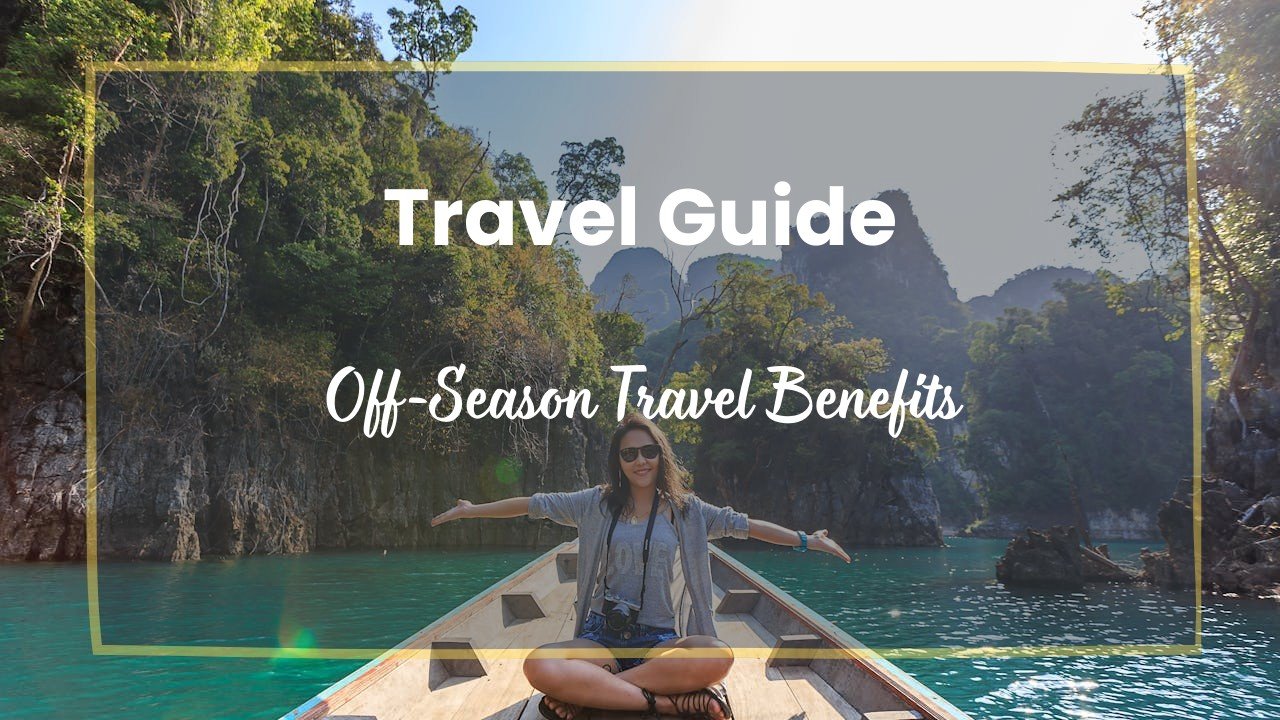Off-Season Travel Benefits for Smarter Exploration
 Off-season travel benefits extend far beyond just saving money. Many seasoned travelers recommend traveling during quieter months for a more meaningful, authentic, and relaxed experience.
Off-season travel benefits extend far beyond just saving money. Many seasoned travelers recommend traveling during quieter months for a more meaningful, authentic, and relaxed experience.
If you are looking for solitude, authentic local interaction, or eco-conscious travel, then venturing off the main tourist routes during peak season may be your best decision.
Save Big on Flights and Accommodations
Off-season travel offers significant savings, which can be a game-changer for budget-conscious and luxury-seeking travelers. In shoulder seasons or months with low tourism, airlines, tour operators, and hotels adjust their pricing to attract more tourists, offering deals that you can’t get during peak times.
- Flight prices can vary from 30% to 50% depending on your destination. The round-trip fare from New York to Barcelona may be more than $900 in July. However, in February, it can be as low as $400.
- In off-peak seasons, hotels and resorts offer upgrades, free breakfasts, or spa credits to increase occupancy. You can get a four-star hotel experience in tropical destinations such as Bali or the Caribbean for less than two stars.
- Many operators offer discounts to walk-ins or for flexible scheduling. Bundled deals may include meals, transportation, and activities at a lower price.
The lower price allows travelers to enjoy premium services and encourages them to stay longer. It also allows them to visit places otherwise out of their reach.
Escape the Crowds and Enjoy Tranquility

Imagine walking through the Louvre without fighting for the Mona Lisa, or soaking in Iceland’s Blue Lagoon in the snowfall. Off-season travel transforms popular hotspots into peaceful havens.
- The attractions are easier to access, so you can enjoy places such as Machu Picchu or the Vatican Museums at your own pace.
- Photographers can capture iconic sights without people in their background, from ancient monuments to sweeping coastline views.
- No long waits, attentive staff willing to converse or provide personalized menu suggestions.
- You can connect more deeply with the moment without the distraction of large tour groups and selfie sticks.
Traveling in a peaceful environment can be meditative, ideal for those seeking renewal and discovery.
Get a More Authentic Local Experience
Off-season travel offers the chance to experience a destination in its proper rhythm, which is present when the place is not designed for mass tourism. Locals don’t feel overworked and overwhelmed. They are more open, present, and willing to share.
- Cultural exchanges become richer. Locals are more willing to talk, share knowledge, and even invite you to take part in traditions. In Tuscany, during the olive harvest in November, you might be invited to a farm run by a family for a tasting.
- The natural process of language learning allows for organic opportunities to be created. Travelers are more likely than others to have genuine educational conversations with locals when English is less spoken.
- Community events are easier to attend. You can attend local festivals, farmers’ markets, and traditional dances instead of tourist shows that require tickets.
- Less commercialization. There are fewer tourist traps. This means more hidden gems — local eateries, boutiques and souvenirs that have meaning.
This kind of connection will change your perception of travel. You won’t just see the world but also feel like you are a part.
Support Local Economies Year-Round

Tourism isn’t a mere business. It’s also a vital lifeline for communities all over the world. This support is unstable when visitors are only present during the peak months. Travelling off-season ensures that your tourism dollars have a positive, steady impact.
- You are helping local families to maintain employment all year round. Every transaction is important, from street food vendors to hotel housekeeping staff.
- Independent businesses flourish. Locally owned accommodations, tours, and restaurants are better than the chain. Your dollars support real dreams.
- Tourist-dependent towns can survive the slow months. When tourists leave, places like Santorini or Cusco can experience sharp economic declines. Your visit can help cushion the seasonal dip.
- Your experience will be more ethical. Travel is a conscious contribution, not a consumption.
Spreading your travels throughout the year will help you to sustainably thrive in communities, not just survive the peak season.
Better Customer Service and Hospitality
The benefits of traveling off-season extend to the way you are treated as a customer. Service professionals can spend more time on you because they have fewer guests to attend to.
- The hotel staff is more accommodating and attentive. You may need a restaurant reservation or an itinerary suggestion. The staff is always willing to assist.
- Many restaurants go the extra mile. Chefs and servers have more time to spend with each table, and they are happy to offer suggestions, explain ingredients, or customize your meal.
- Storytellers are tour guides. Guides can customize your experience with smaller groups or even on private tours. They can also dive deeper into the cultural context and lesser-known stories.
- You’re remembered. Some staff members and locals remember your name and preferences and will greet you as if you were a friend, not just another customer.
The human touch will make your trip memorable for all the best reasons.
Eco-Friendly and Sustainable Travel Choice

Traveling during high season can severely affect the environment. Overcrowded attractions and infrastructure are common problems. Traveling off-season is an innovative and sustainable alternative.
- Nature regenerates. Ecosystems can regenerate with fewer people on beaches and trails.
- Infrastructure breathes. Waste systems, transport, and accommodation are not pushed to their limits.
- Adopting eco-friendly practices is easier. You can use public transportation more efficiently, refill your water bottles, and reduce waste.
- You reduce overtourism. You help reduce over-tourism.
- Traveling off-peak can be good for you and the environment.
Final Thoughts
Off-season travel offers many practical and enriching benefits. You can save money, support local communities, protect the planet, and have a more authentic experience. Consider taking the road less travelled, whether you are planning your first solo vacation or your fifty-fifth passport stamp.
FAQs
What is the meaning of off-season in tourism?
The off-season is usually the time when there are no tourists or when sports enthusiasts have to take some time away from their games. In seaside resorts, the summer is off-season. In the off-season, there are fewer tourists, and businesses may offer discounts to lure them.
What season is the cheapest to travel?
According to travel booking sites, airfares are at their highest in June. They usually drop by in September, and low fares are usually available until October.
What is the best season to travel?
Traveling within the US during spring is best (late March through late May), or in autumn (late September until late October). These shoulder seasons are milder and have fewer tourists in popular destinations.
Is it safe to travel during the off-season?
Do a bit of research. Some destinations have limited services or weather risks during off-peak hours. Off-season travel can be just as safe with the right planning. It is often safer because there are fewer people.







